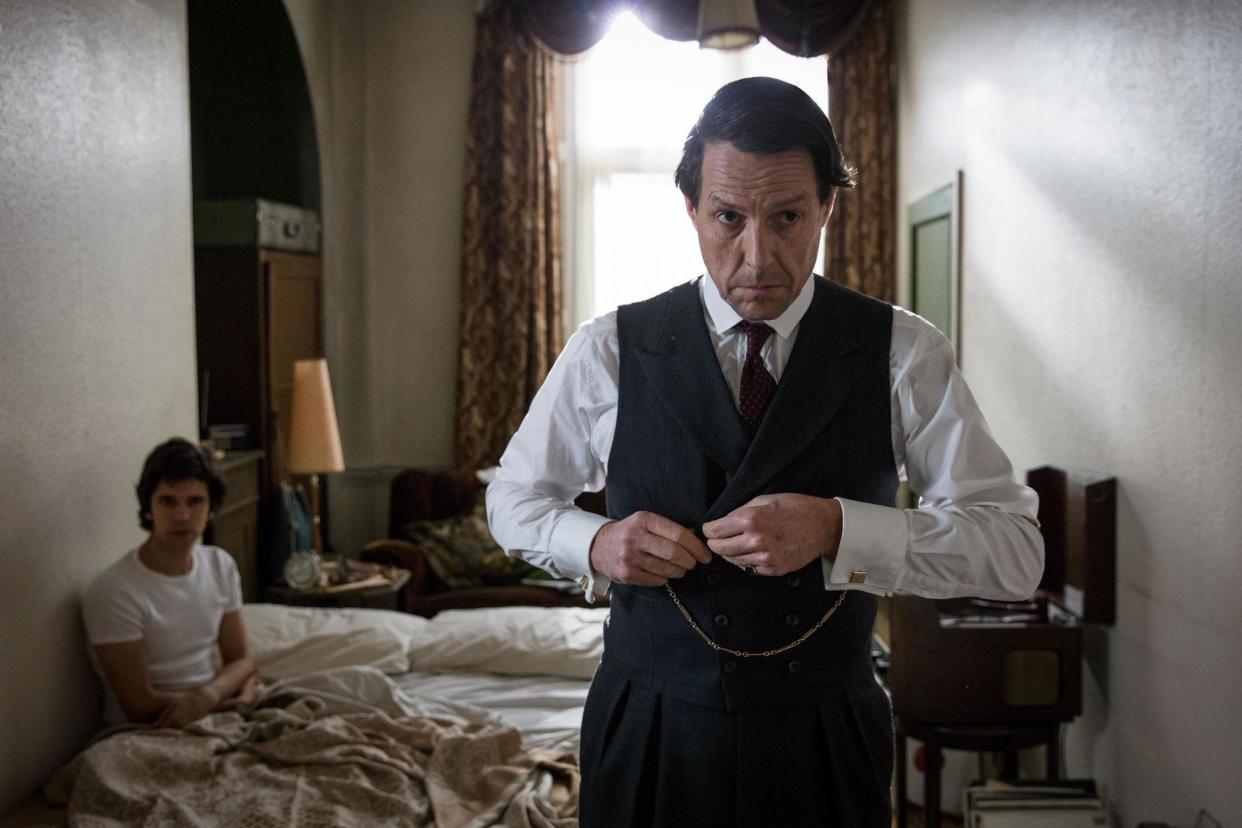The politics, passions, and people of 'A Very English Scandal'

One of the more interesting comments Russell T Davies made in the weeks before A Very English Scandal first aired was that he thought “both [Norman Scott and Jeremy Thorpe] were victims”, in a way.
It’s perhaps not immediately apparent why Davies considered Jeremy Thorpe a victim, given after all that A Very English Scandal dramatises Thorpe’s efforts to have Norman Scott killed. It’s a story of power, politics, and passion, of conspiratorial whispers in the hallowed halls of power, and Thorpe is at the very heart of that. Casting Hugh Grant was, in many way, a stroke of genius; his Thorpe isn’t just suffused with predatory menace, but, as many have noted, feels informed by his past as a charismatic romantic lead. In turn, Grant’s Thorpe is a vision of that charm, curdled into something darker – there’s an undefinable, irresistibly engaging quality about him, even knowing there’s something rotten lurking within. Declaring Norman Scott must die with as much conviction as he opposes racism in the House of Commons, or planning how to dispose of his body with the same light, casual ease as mimicking the Prime Minister, doesn’t exactly seem to support the understanding that Thorpe is anything short of a Machiavellian villain.
But, if it’s difficult to see Thorpe as a victim from the first two episodes, it’s a scene in A Very English Scandal’s closing episode that renders Davies’ point crystal clear.
After the trial, while still awaiting a verdict, lawyer George Carman (a brief yet brilliant turn from Adrian Scarborough) poses Thorpe a question: “I still keep wondering something else. Why Norman? It went on for years […] You loved him. Why that man?” What follows is a rare moment of vulnerability; the script describes Thorpe as “so wanting to talk”, coming “as close to a confession to a confession as he will ever get”. Fast, vivid images follow, an intercut series of brief encounters, Jeremy Thorpe with different men, five, ten, twenty years ago – each encounter fast turning “violent”, each leaving him “terrified”.
It recalls a moment from A Very English Scandal’s first episode, when another politician describes gay men as “murdered by the laws of the land”; the story begins in London 1965, two years before homosexuality was decriminalised in the UK. The laws of the land and the violence that left Thorpe terrified spring from the same attitudes, the same homophobia; there’s perhaps a certain similarity to The Assassination of Gianni Versace, which feels like something of an American companion piece to A Very English Scandal, and how it too depicted homophobia as a wider, cultural act of systemic violence.

Discussing attempts to change the law, Thorpe dismisses the idea it’ll bring him any sort of freedom; “those men will be free to be pitied,” he says, insisting “I don’t care what changes they make to the law, if anything about me ever became public […] I’ll put a gun to my head and blow my brains out.” It’s shame and repression laid bare, its ends plainly articulated, as Thorpe too would be murdered, if not by the laws of the land, but by the sensibilities of a society.
What also becomes clear, though, is perhaps the most striking difference between Norman Scott and Jeremy Thorpe – and George Carman, and Peter Bessell, and any of the establishment figures caught between two worlds we see across A Very English Scandal. Norman “tells the truth and doesn’t care” – as Bessell puts it, “no one else does that [..] in the whole of this land, there is Norman and Norman alone”.
Norman Scott, in a way, is the opposite of Jeremy Thorpe – and so it becomes clear just how well Ben Whishaw’s performance complements Hugh Grant’s. Whishaw’s Scott is mercurial and quixotic, his open, sprawling emotion a marked contrast to Grant’s much more mannered, much more reserved take on Thorpe. Where Norman’s apparent naivety and sensitivity distract from a greater strength, Thorpe’s suave façade of easy confidence masks a certain insecurity. There’s moments throughout that seem to suggest that Thorpe could’ve, or perhaps could’ve wanted to, live life like Norman. With Norman, even. Moments of envy, moments where he imagines a different life.
And that’s where Davies’ view clicks into place, how it’s obvious Thorpe is a victim too, in his way, a victim denied a different life. But it also affirms Thorpe’s place as the villain of the tale, because in the end, he’s not a great deal better than those terrifying, anonymous men. Shame didn’t drive Thorpe to put “a gun to [his] head”, it drove him to put one to Norman’s. Even as he’s a victim of systemic, violent homophobia, Thorpe is himself a part of it, wielding it, rendered indistinguishable from it.
The Very English Scandal, then, perhaps isn’t actually the Thorpe affair itself. Maybe the scandal is the circumstances that let it happen at all.
Related:
How The Good Fight found clarity in chaos, and answers in absurdity
Like this article? Hate this article? Why not follow me on twitter for more, or send me a message on facebook to tell me what you thought? You can also find more of my articles for Yahoo here, or check out my blog here.

 Yahoo Movies
Yahoo Movies 

